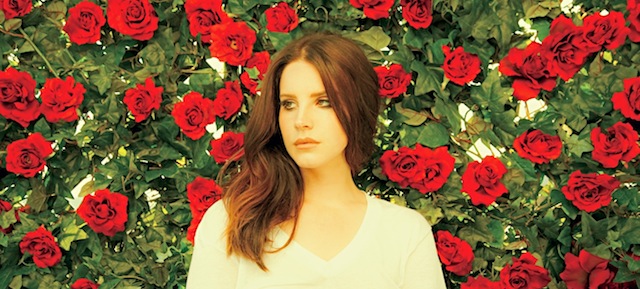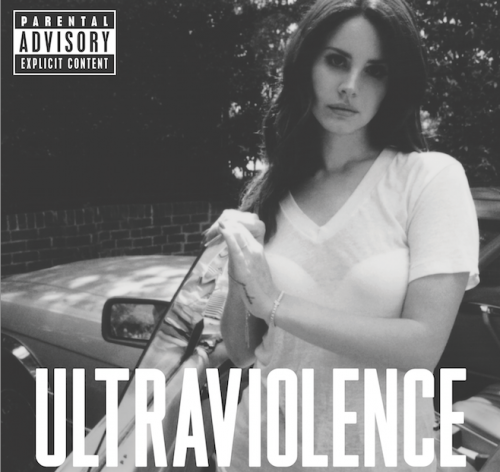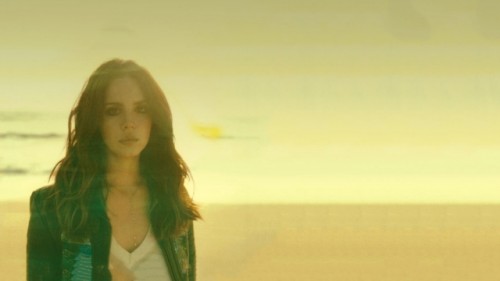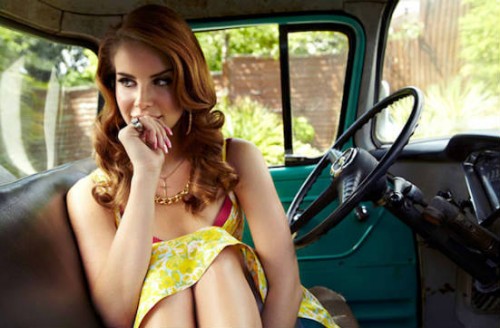
Matthew Linder (who gave Mbird a delightful treatise on Willy Wonka) and I, for well over a week and counting, have been infatuated with the newest Lana Del Rey album, and conversations over Facebook and email ensued. Below are some of the highlights of our discussion of what we both consider a tremendously beautiful and heart-wrenching album.
 Blake:
Blake:
So from the first listen, I felt an aural tie to the gothic americana genre, but without the usual folk/bluegrass instrumentation. Gothic americana is notorious for using religious allusion and imagery for often non-religious reasons. It is all tied into this idea of Flannery O’Connor’s famous phrase of the “Christ-haunted South”. Elements of the old religion are still present, but they are emptied of their life-giving power. Gothic americana is full of the sentiments of violence and abuse and the eccentricities of locales, but very seldom does it speak of the darkness and Christ-hauntedness found in broken relationships.
…and that is where I think Ultraviolence comes in. Distorted love grounded in fame, power struggles, money, unfaithfulness, escape (through drugs often) and other narratives. Such albums are not unusual, but Lana takes it one more step down the rabbit hole with allusions to Clockwork Orange, New York cults, Miami drug scenes, unhappy gold-digging marriages, etc.
I think what I originally liked about the album, and the musicality of it, is that none of it is really terribly upbeat. It is suffocating, closed in, almost ambient in some ways. Nothing about this album emits happiness, but I find it to be a terribly cathartic album. I am not sure I would pick another album to listen to during the troubling moments of life. I may not know the specific relational circumstances she has found herself in, or the other trials either, but something about the music and the feel of the album pulls some of the relational battles I have encountered in my life out into the open.
Matt:
I think you are onto something with this album being “Christ-haunted” and I see that as a continuation of the religious themes that were given a new context and meaning on her previous album Born to Die and, particularly, in her short film Tropico. She has on a number of occasions spoken of her spirituality, most recently, in an interview with NPR where she states, “I feel a strong relationship with God and I feel my ties are with him. That’s how I honestly feel. Everything I do, I do it for somebody I’ve never met before, something in the great beyond. That’s my primary relationship, really, is with something divine. I feel a connection as real with that as I’ve ever had with anybody on this earth.”
Warning: Video does contain explicit material.
[youtube=https://www.youtube.com/watch?v=VwuHOQLSpEg&w=600]
What I find interesting with that statement is that throughout Ultraviolence her lyrics indicate a desire not to have God in her life. For instance, in “Money Power Glory” she sings, “You talk lots about God/Freedom comes from the call/But that’s not what this b*tch wants/Not what I want at all” but wants all the things in the title of the track instead. There may even be an allusion to Matthew 5:45 where she aligns herself with the unrighteous instead of God, “The sun also rises/On those who fail to call/My life, it comprises/Of losses and wins and fails and falls”.
Musically, as a whole the album is much slower and more ambient than Born to Die, and she trades in the whole gangsta Nancy Sinatra hip-hop vibe for a more earthy and bluesy one. I think her producer called it “narco-swing”, a fitting term, as it does have a laborious, drudging-through-the-muck feel, yet with moments that are fantastical and otherworldly. For instance, the way she sings the chorus to “Shades of Cool” comes to mind.
Blake:
To me, “Cruel World” is a hell of a track to set the tone for the album. “You got your bible and your gun/And you love to party and have fun/And I love your women and all your heroin/And I’m so happy that you’re gone”. One of my absolute favorite things to think about is the interplay of violence and the Gospel. Bible and gun. An engrossing (and true) narrative promising redemption, everlasting life and shalom that finds its culmination in the worst incidence of violence ever recorded. Completely innocent God-man crucified for the sins of the world. Out of this instance of violence comes real, lasting peace. The Bible and the gun. Such powerful imagery in my mind.
And, man, I don’t even know where to start with the song “Ultraviolence”. There are so many disturbing elements. Such abuse and dark imagery that is compared(/contrasted?) to things that are considered good and beautiful. “He hit me and it felt like a kiss”; “he hurt me and it felt like true love”; “Give me all of that ultraviolence”.
Matt:
“Ultraviolence” I also find hard to gauge if she is celebrating/glorifying these elements of violence and darkness or if she is describing how she contextualized those elements in the moment. That the whole song is expressing emotions and thoughts in the midst of that turmoil without further reflection at a distance on whatever events inspired the song. I’m not sure what to think but I find the lyrics disturbing to say the least.
 Perhaps one of the keys to understanding the album as a whole is Del Rey’s cover of Nina Simone’s “The Other Woman” at the end of the album. In many ways Del Rey (either autobiographically or as her persona) views herself as an outsider, an interloper in her various relationships with men. To me that is the connecting thread, how lonely, unsatisfied and powerless one is being in that position of the other woman and the very human ways she tries to find satisfaction and gain power over her situation.
Perhaps one of the keys to understanding the album as a whole is Del Rey’s cover of Nina Simone’s “The Other Woman” at the end of the album. In many ways Del Rey (either autobiographically or as her persona) views herself as an outsider, an interloper in her various relationships with men. To me that is the connecting thread, how lonely, unsatisfied and powerless one is being in that position of the other woman and the very human ways she tries to find satisfaction and gain power over her situation.
This identity takes various meanings and forms on the album, from actually being the other woman in “Shades of Cool” and “Sad Girl”, conflicted as to who she is in “Ultraviolence” (is she deadly or submissive), one of many women in “Cruel World” or the woman who is other (“I am a dragon, you’re a whore”) because she “passed the test” in “F*cked My Way Up To The Top”.
The album begins with her giving herself up to a man (“Share my body and my mind with you”) but when we come to the end she is alone (“And as the years go by the other woman will spend her life alone, alone, alone”). The journey from surrendering herself to these relationships to isolation plays out in dichotomies between power/weakness, submissiveness/femme fatale, violence as beauty/using beauty for violence, spiritualizing relationships and self/dismissing God, trusting in money/money doesn’t satisfy, etc. I can relate with Del Rey because I have given all of myself to someone before, felt the multitude of conflicting emotions that Del Rey has and used language about God in the context of that romantic relationship while refusing to seek out God.
A moment that struck me is the tonal shift from the self-congratulatory slow electronic dance number, “F*cked My Way To The Top” (the only all electronic track on the album), to the fleeting glory of opulence in “Old Money” (featuring only acoustic piano and strings). In the latter song, I believe the line where she sings: “My father’s love was always strong/My mother’s glamour lives on and on/Yet still inside I felt alone/For reasons unknown to me” is the crux of the album. She does not think she should feel alone and the whole album in my view is her wrestling with those “reasons unknown” through various relationships. That is where I believe “The Other Woman” comes in at the end as the “reason” why she thinks she feels alone.
Perhaps her recent controversial interview with the Guardian could be instructive here, where she speaks of wanting to die, being unsatisfied with life and feeling like her life is a messed up movie.
Blake:
 I may be doing the same romanticizing as Lana Del Rey here, but I just finished that article and I came away from it loving her that much more. Is that strange to say? Very little of what is presented is something to be really endeared by, but, yet, I am endeared to her. Maybe it’s just the honesty.
I may be doing the same romanticizing as Lana Del Rey here, but I just finished that article and I came away from it loving her that much more. Is that strange to say? Very little of what is presented is something to be really endeared by, but, yet, I am endeared to her. Maybe it’s just the honesty.
I love your trajectory of the album. I think it is solid and I love the dichotomies that you bring up. I mean how true is that though? None of us are balanced. We are like pinballs in a pinball machine…bouncing from one extreme to the next, never resting at any one spot…or, adversely, going straight down the gutter…
Which is why we rely on God to sustain us, right? To be the buffer for our frenzied states: sinner/saint, lovers/haters, etc. Part of me thinks that is why this album works so well, because Lana Del Rey is expressing the schizophrenia of human nature within the relationship of lovers. She confronts the bare bones of who we are and begs the question of whether anything can reach out and save us from ourselves because I don’t think she would say she can save herself—she definitely doesn’t think she can save her lover. If she did say that, her music would call her a liar.
The kind of love presented in this album is a type of escape. She is escaping her existential dread by losing herself in those seriously messed up relationships instead of seeking or finding a love that will build her up. A pure, one-way love. The only way one-way love works is between God and humanity because God is love…and yet He died to express and show his love. The Divine Sacrifice was grace exactly because it was God voluntarily giving Himself up for the people He made a promise to, because of His love for them. Humanity has the example of one-way love from God to humanity, but we are so selfish in our very nature that we never completely give ourselves to anyone…including God.
And it is killing us, as I think this album declares boldly.
All this to say that contrary to surface appearances, this album strikes me as so much more than just despair and reveling in the darkness of life, love and human nature. And I think you have hit on those same notes. There is a hope there. It’s far off, a pin-prick of light, but it shines so brightly for all of the darkness around it.
[youtube=https://www.youtube.com/watch?v=oKxuiw3iMBE&w=600]

COMMENTS
One response to “New Music: Lana Del Rey’s Ultraviolence”
Leave a Reply













This a really awesome album. It makes me want to take 10 hits of acid and stare at a wall. It’s wonderful and her vocals are good, the music is pleasant.